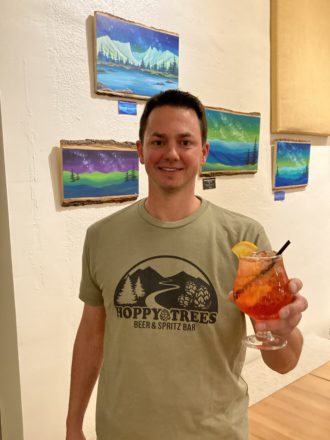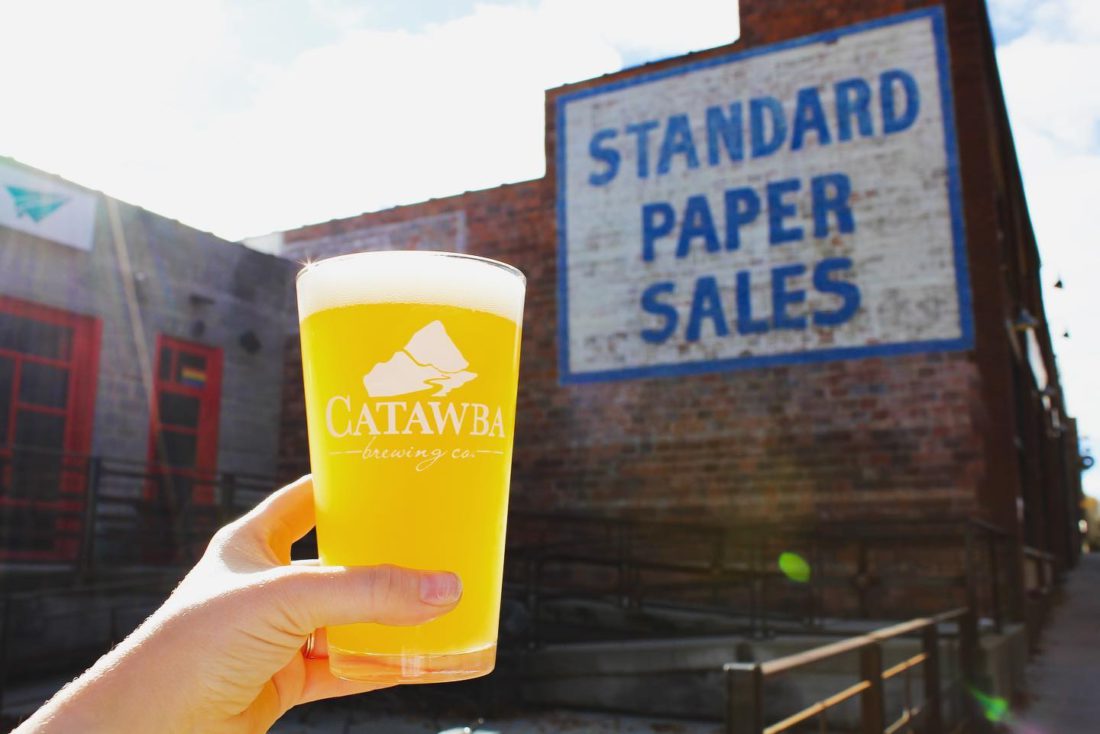Brian Ivey isn’t naive to the ways of late-stage capitalism, but the former Catawba Brewing Co. retail marketing and communications director is nevertheless disappointed by what he feels is a lack of honesty and respect that the brewery’s new owners, Alabama-based Wiregrass Equity Partners, showed him and his leadership team colleagues on their way to the unemployment line.
On Nov. 1, after running the company for 22 years, Catawba co-owners Jetta and Billy Pyatt sold the business and Charleston, S.C.-based Palmetto Brewing Co. to Wiregrass — whose portfolio includes the craft beer collective holding company Made by the Water, LLC, which owns and operates the Florida-based Oyster City Brewing Co. According to Ivey and former Palmetto marketing manager Tarah Gee, who were present during meetings with the then-prospective buyers, Wiregrass assured the team that everyone’s jobs were secure.
“Wiregrass claimed they were investing in our people, whose work they’d observed and admired from a distance for many months,” Ivey says. “We were told that our six-person leadership group would be integral to leading the company into its next generation.”
But by Nov. 12, Ivey, Gee and another leadership group member had been fired, along with several other employees. The Pyatts declined to comment for this article. MBTW CEO Alexi Sekmakas, however, says no such employment guarantees were made. He notes that product development and brewing positions “remain fragmented and individualized per [MBTW] location,” but that finance, HR and other administrative support jobs “are fully integrated across the platform.” Factor in less than ideal current market conditions, and he says initial operations for Catawba and Palmetto are leaner than he and his colleagues would have hoped.
“Our goal was to bring these companies together in as harmonious a way as possible,” Sekmakas says. “Through all the issues we’ve been having with COVID and supply chain shortages and this highly tumultuous, unprecedented time, we just had to make some changes. It’s not something that we ever want to do, but we’re heading into a slow season and we’re coming out of a global pandemic, so I’m hopeful that we’re going to be able to make deeper investments and hire more and more people over the next couple of months, once we come out into the spring.”
In hindsight, Ivey says the lack of communication that followed the Nov. 1 deal should have been a red flag, but the Catawba team was told the new owners were focused on closing a deal on a new production facility in Mobile, Ala. He now believes MBTW’s plan all along was to slash payroll, eliminate several jobs and outsource others to the Oyster City team in the Florida Panhandle.
Ivey views the strategy as consistent with a larger trend over the past five years of private equity encroaching on craft beer, resulting “in money flowing out of the community to enrich some anonymous multimillionaire investor group that doesn’t care about your town or its local workers.” He adds that because PE investors typically aren’t satisfied to collect off annual profits, the classic PE playbook involves slashing payroll to maximize short-term profits with the expectation that the newly acquired company, which is now just a portfolio fund, will be quickly flipped again.
“Everything that’s happened at Catawba since Nov. 1 points toward a textbook PE slash-and-burn strategy. On the phone call in which my job was declared ‘redundant,’ I spent the first couple minutes with the Wiregrass HR manager answering questions about the weather in Asheville — because he literally knew nothing about where we live and work,” Ivey says.
Sekmakas says MBTW wants to continue making investments in Catawba’s two Asheville tasting rooms, including the brewing systems, and that Asheville general manager Ben Wiggins is motivated to add additional Buncombe County locations. Sekmakas also notes that since acquiring Oyster City, MBTW has “done a lot to get ourselves involved with the community” and aims to piggyback on Catawba’s work within Asheville.
“We’ve got a great team in there already, but we want to continue pushing the envelope on these innovative beer styles, and Asheville is the perfect community to do that with,” Sekmakas says. “We feel like we’re taking on a big responsibility with Catawba. This isn’t just another corner neighborhood brewery. It’s a piece of the community and a part of the local, North Carolina beer culture. So, that’s something we don’t want to fumble, certainly, but want to use to advance the craft beer culture of the Southeast as a whole.”
Ivey isn’t sure what’s next for him, but says his heart is still in Asheville beer. After the holidays, he’ll begin looking for a new position and would love to use all that he learned in nearly seven years at Catawba and apply it toward telling more stories of local craft beer and the people behind it.
North Buncombe niche
Paul Carielli has long worked in sales, moving everything from sneakers to used cars, and even preowned mattresses, all while figuring out what he wanted to do with his life. Then, while serving as the beer rep for Twin Leaf Brewery, he felt empowered to try his hand at entrepreneurship.

“I delivered beer to many of the restaurants and bottle shops in this area, as well as Charlotte and Raleigh,” says Carielli, a native of New York’s Hudson Valley area. “I saw everyone being successful and thought maybe I can do this, too.”
Drawing inspiration from Bob Ross, whom Carielli refers to as “America’s beloved happy tree painter,” the Weaverville resident opened Hoppy Trees Beer & Spritz Bar in September in his adopted hometown. Situated in the back corner of the historic Shope’s Furniture building, the family-friendly establishment showcases local artists’ works on its walls and offers distinct beverage options.
Carielli says he “didn’t want to step on anybody’s toes” in the menu department, noting his bar’s proximity to Eluvium Brewing Co., Zebulon Artisan Ales and Maggie B’s Wine & Specialty Store. When a friend introduced him to Venice Spritz, he knew he had found his niche beverage. According to Carielli, the drink is largely unknown in the U.S. but is popular in Europe and is precisely the type of signature offering he was seeking.
“It’s the Italian apéritif bitter liqueur mixed with Prosecco on ice with an orange slice, and it becomes irresistibly refreshing,” Carielli says. “In eight weeks of operation, I’ve sold close to 750 of them already. It’s definitely trumping the beer and wine sales.”
That creative flair and respect for Carielli’s neighbors also extends to Hoppy Trees’ draft and packaged products. While working for Twin Leaf, he saw how difficult it was to get the brewery’s products on tap at certain restaurants, bars and bottle shops, so he’s made it a priority to carry items from smaller, self-distributing, local mom-and-pop breweries as much as possible. Clients thus far have included Homeplace Beer Co., Sweeten Creek Brewing, Hillman Beer and Riverside Rhapsody Beer Co.
Hoppy Trees Beer & Spritz Bar is at 7 Florida Ave., Weaverville. For more information, visit avl.mx/wordcap7
Silver sipper
At the start of the COVID-19 pandemic, the Chemist Spirits ownership team decided to focus on hyperlocal projects with Asheville-based companies. In turn, the team developed a chocolate orange gin liqueur with French Broad Chocolates and more recently worked with Green Man Brewery after owner Dennis Thies reached out about collaborating on a special whiskey to celebrate his company’s 25th anniversary.
“This project in particular was superattractive because it’s all made with grain that Green Man brings in for their beer, so we knew we wouldn’t have any supply chain shortages,” says James Donaldson, Chemist co-owner and director of marketing. “And in return, they ended up storing barrels for us. We ran out of space and couldn’t build anything during the pandemic.”
Donaldson feels that the 88 proof final product plays to the strengths of Green Man’s abilities as brewers and Chemist’s strengths as distillers and barrel masters.
“Really, it was just neighbors coming together to help each other out and make something fun,” Donaldson says. “We would come over and have beers with them; they would come over and have drinks with us. Even this summer, as things were starting to mellow out, we would have them up to our rooftops and have these socially distanced tastings to preview the barrels and talk about how we wanted to approach this product.”
The bottle debuted on Nov. 6 and has proved more popular than Donaldson imagined. Though he’d anticipated it lasting through the holidays, it’s looking as if the last batch of a little over 100 cases will sell out before then.
“The Green Man customer base is extremely loyal, so we’ve just seen a massive response from not just Chemist fans and people that buy our whiskey, but a whole new category of people that are getting to know our brand and our spirits for the first time, just through Green Man,” he says.



Did the new buyers taste the beer before the purchase? Worst beer made here. Not close.
Anytime private equity operations purchase any business the result is always at the expense of the local workforce. They operate to generate quick profits and always tell the current workers their jobs are safe. They are safe for a realitively short period of time while the equity firm gains knowledge from the dedicated workers and then “consolidate and eliminate” while giving bs reasons for having to do so. It’s too bad the local ownership did not care enough to sell to Local interests. The response from Ashevillle customers should be Shut Catabwa down! Don’t go there, don’t work there and don’t buy their products elsewhere.